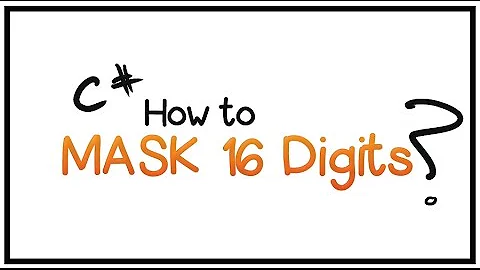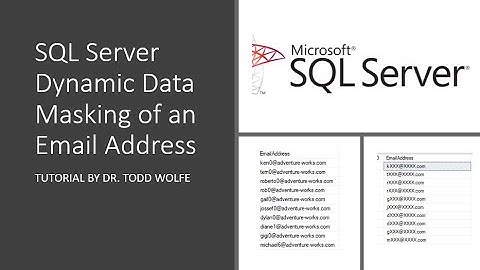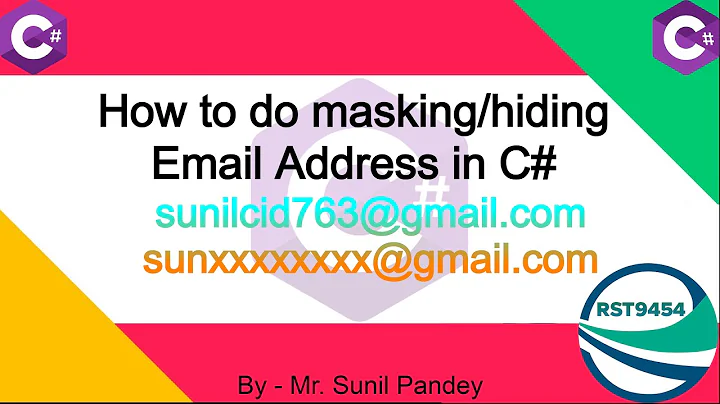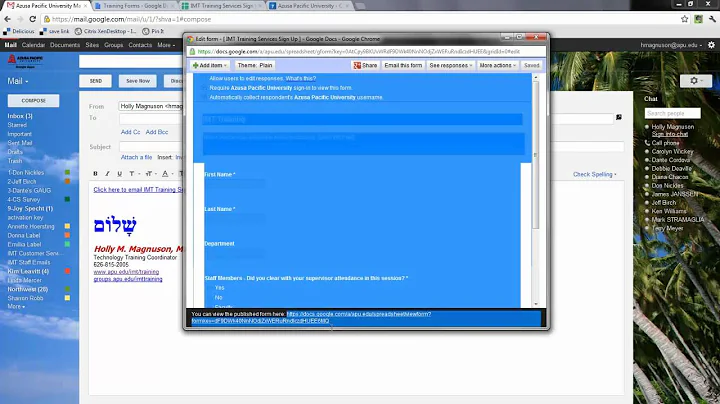how to do masking/hiding email address in c#
Solution 1
Here is a approach to solve this with Regex
string input = "[email protected]";
string pattern = @"(?<=[\w]{1})[\w-\._\+%]*(?=[\w]{1}@)";
string result = Regex.Replace(input, pattern, m => new string('*', m.Length));
//j**[email protected]
Explanation:
(?<=[\w]{1}) the name has to start with 1 word-character
[\w-\._\+%]* the replacement-part can contain 0-n word characters including -_.+%
(?=[\w]{1}@) the name has to end with one word character followed by a @
Depending on the amount of characters you want to remain unchanged you can change {1} to {2} or something else at the beginning or at the end.
Solution 2
If you always want to mask anything between first character and last character before @ with fixed number of masked characters , you can use the below
var email="[email protected]";
var maskedEmail = string.Format("{0}****{1}", email[0],
email.Substring(email.IndexOf('@')-1));
You can alter the above line for your requirement.
The above line will give you the result "a****[email protected]"
Note that masking the email always with a fixed number of characters will make it difficult to guess the email and is slightly more secure.
after mask: a****[email protected]
Solution 3
I can't see where your k variable is initialised in your code snippet. If I had to take a wild stab as to why you are getting an index out of bounds exception that would be my stab.
Although I would say that you could achieve something very similar to what you are doing using Regex. I did it like this:
public string ObfuscateEmail(string email)
{
var displayCase = email;
var partToBeObfuscated = Regex.Match(displayCase, @"[^@]*").Value;
if (partToBeObfuscated.Length - 3 > 0) {
var obfuscation = "";
for (var i = 0; i < partToBeObfuscated.Length - 3; i++) obfuscation += "*";
displayCase = String.Format("{0}{1}{2}{3}", displayCase[0], displayCase[1], obfuscation, displayCase.Substring(partToBeObfuscated.Length - 1));
} else if (partToBeObfuscated.Length - 3 == 0) {
displayCase = String.Format("{0}*{1}", displayCase[0], displayCase.Substring(2));
}
return displayCase;
}
Here is a fiddle of all your test cases provided passing pretty close to what you were describing https://dotnetfiddle.net/fU2RUo
[EDIT] My code doesn't try to obfuscate emails whose addresses before the @ are less than 3 characters long, if this is a requirement you would need to amend the code but I didn't think it was a very realistic case to have to build a case for.
Solution 4
I wanted to mask emails like this A****B@C****D.com. This also works with emails that have multiple dots or no domain extension.
public string MaskEmail(string email)
{
if (string.IsNullOrEmpty(email) || !email.Contains("@"))
return email;
string[] emailArr = email.Split('@');
string domainExt = Path.GetExtension(email);
string maskedEmail = string.Format("{0}****{1}@{2}****{3}{4}",
emailArr[0][0],
emailArr[0].Substring(emailArr[0].Length - 1),
emailArr[1][0],
emailArr[1].Substring(emailArr[1].Length - domainExt.Length - 1, 1),
domainExt
);
return maskedEmail;
}
Results
[email protected] >> i****o@s****w.com
[email protected] >> m****e@g****e.nl
[email protected] >> w****r@s****w.org
test@noextension >> t****t@n****n
[email protected] >> x****x@y****y.net
Solution 5
I wrote this method as it was easier to customize for my specific masking requirements.
- Input: [email protected]
- Output: m****il@*******.com
I hope this helps someone. If so, please mark the answer helpful.
public static string MaskEmail(this string email)
{
var emailsplit = email.Split('@');
var newsplit = emailsplit[1].Split('.');
char[] array1 = emailsplit[0].ToCharArray();
char[] array2 = newsplit[0].ToCharArray();
var output = "";
for (int i = 0; i < array1.Length; i++)
{
if (array1.Length > 4)
{
if (i == 0 || i == array1.Length - 1 || i == array1.Length - 2)
{
output += array1[i];
}
else
{
output += "*";
}
}
else
{
if (i == 0)
{
output += array1[i];
}
else
{
output += "*";
}
}
}
output += "@";
for (int i = 0; i < array2.Length; i++) output += "*";
for (int i = 1; i < newsplit.Length; i++) output += "." + newsplit[i];
return output;
}
Related videos on Youtube
Sara Khan
Updated on September 15, 2022Comments
-
Sara Khan over 1 year
i have an issue, i have to apply masking/hiding part of email address in c#. example
[email protected]==> jh**[email protected] [email protected]==> bi****[email protected] [email protected]==>br*******[email protected]i have this code but its giving exception for some emails. "Index was outside the bounds of the array."
for (int i = 0; i < eml.Length; i++) { int j = i == (eml.Length - 1) ? 0 : 1; cc = eml[i].ToString(); if (i <= 1) { dispeml += cc; } else if (eml[i + (j + k)].ToString() == "@") { dispeml += cc; k = 0; fl = 1; } else if (eml[i + j].ToString() == "@") { dispeml += cc; fl = 1; } else if (fl == 1) { dispeml += cc; } else { dispeml += "*"; } }-
 SteveWhy don't you start your debugger and look what happen in this code? You are in the best position to discover the fault. Just put a breakpoint at the start of this code and run the debugger.
SteveWhy don't you start your debugger and look what happen in this code? You are in the best position to discover the fault. Just put a breakpoint at the start of this code and run the debugger. -
Richard"giving exception for some emails": I suppose we could guess what they are. But it would be better to include the details of which emails are failing with which exception and what point in the code.
-
-
Saad Farooq about 8 yearsGreat Solution. Thank you for the Regex! :)
-
Djorge almost 7 yearsHow would I make this affect the domain of the e-mail address as well?
-
 fubo almost 7 years@Djorge that's a bit tricky because the domain technically cold be
fubo almost 7 years@Djorge that's a bit tricky because the domain technically cold be@foo,@foo.bar.comor@192.168.1.1beside the trivial case@foo.com -
Djorge almost 7 yearsI ended up adding
|(?<=@[\w]{1})[\w-_\+%]*(?=\.)to the end of your regex to get what I wanted, doesn't handle@foothough. -
needfulthing about 5 years@Djorge If you remove the at sign in your addition, you can also match multiple domain parts. The whole expression would be (?<=[\w]{1})[\w-\._\+%]*(?=[\w]{1}@)|(?<=[\w]{1})[\w-_\+%]*(?=\.) then








